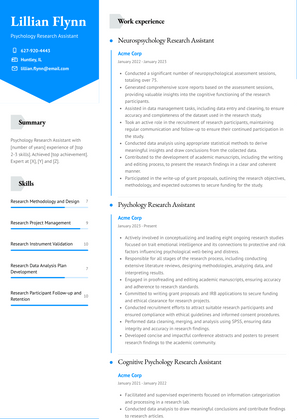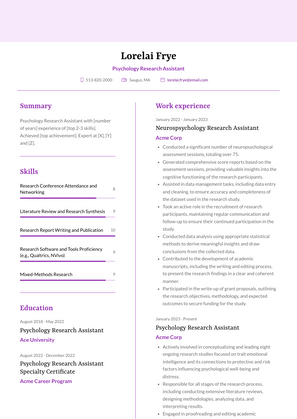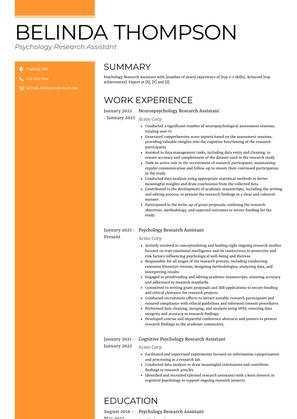3+ Psychology Research Assistant Resume Examples and Templates
This page provides you with Psychology Research Assistant resume samples to use to create your own resume with our easy-to-use resume builder. Below you'll find our how-to section that will guide you through each section of a Psychology Research Assistant resume.



What Do Hiring Managers Look for in a Psychology Research Assistant Resume
- Strong research skills for data collection and analysis.
- Attention to detail in recording accurate data.
- Analytical thinking to analyze research data.
- Strong organizational skills in managing research materials and activities.
- Effective communication and interpersonal skills for collaboration and presenting findings.
How to Write a Psychology Research Assistant Resume?
To write a professional Psychology Research Assistant resume, follow these steps:
- Select the right Psychology Research Assistant resume template.
- Write a professional summary at the top explaining your Psychology Research Assistant’s experience and achievements.
- Follow the STAR method while writing your Psychology Research Assistant resume’s work experience. Show what you were responsible for and what you achieved as a Psychology Research Assistant.
- List your top Psychology Research Assistant skills in a separate skills section.
How to Write Your Psychology Research Assistant Resume Header?
Write the perfect Psychology Research Assistant resume header by:
- Adding your full name at the top of the header.
- Add a photo to your resume if you are applying for jobs outside of the US. For applying to jobs within the US, avoid adding photo to your resume header.
- Add your current Psychology Research Assistant position to the header to show relevance.
- Add your current city, your phone number and a professional email address.
- Finally, add a link to your portfolio to the Psychology Research Assistant resume header. If there’s no portfolio link to add, consider adding a link to your LinkedIn profile instead.
Bad Psychology Research Assistant Resume Example - Header Section
Michaela 308 E. Homewood Lane Westford, MA 01886 Marital Status: Married, email: cooldude2022@gmail.com
Good Psychology Research Assistant Resume Example - Header Section
Michaela Bean, Westford, MA, Phone number: +1-555-555-5555, Link: linkedin/in/johndoe
Make sure to add a professional looking email address while writing your resume header. Let’s assume your name is John Doe - here is a formula you can use to create email addresses:
- firstnamelastname@email.com - johndoe@email.com
- firstname.lastname@email.com - john.doe@email.com
- lastname.firstname@email.com - doe.john@email.com
- f.lastname@email.com - j.doe@email.com
- l.firstname@email.com - d.john@email.com
- firstnamelastname12@email.com - johndoe12@email.com
For a Psychology Research Assistant email, we recommend you either go with a custom domain name (john@johndoe.com) or select a very reputed email provider (Gmail or Outlook).
How to Write a Professional Psychology Research Assistant Resume Summary?
Use this template to write the best Psychology Research Assistant resume summary: Psychology Research Assistant with [number of years] experience of [top 2-3 skills]. Achieved [top achievement]. Expert at [X], [Y] and [Z].
How to Write a Psychology Research Assistant Resume Experience Section?
Here’s how you can write a job winning Psychology Research Assistant resume experience section:
- Write your Psychology Research Assistant work experience in a reverse chronological order.
- Use bullets instead of paragraphs to explain your Psychology Research Assistant work experience.
- While describing your work experience focus on highlighting what you did and the impact you made (you can use numbers to describe your success as a Psychology Research Assistant).
- Use action verbs in your bullet points.
Psychology Research Assistant Resume Example
Psychology Research Assistant
- Actively involved in conceptualizing and leading eight ongoing research studies focused on trait emotional intelligence and its connections to protective and risk factors influencing psychological well-being and distress.
- Responsible for all stages of the research process, including conducting extensive literature reviews, designing methodologies, analyzing data, and interpreting results.
- Engaged in proofreading and editing academic manuscripts, ensuring accuracy and adherence to research standards.
- Committed to writing grant proposals and IRB applications to secure funding and ethical clearance for research projects.
- Conducted recruitment efforts to attract suitable research participants and ensured compliance with ethical guidelines and informed consent procedures.
- Performed data cleaning, merging, and analysis using SPSS, ensuring data integrity and accuracy in research findings.
- Developed concise and impactful conference abstracts and posters to present research findings to the academic community.
Neurospsychology Research Assistant Resume Example
Neurospsychology Research Assistant
- Conducted a significant number of neuropsychological assessment sessions, totaling over 75.
- Generated comprehensive score reports based on the assessment sessions, providing valuable insights into the cognitive functioning of the research participants.
- Assisted in data management tasks, including data entry and cleaning, to ensure accuracy and completeness of the dataset used in the research study.
- Took an active role in the recruitment of research participants, maintaining regular communication and follow-up to ensure their continued participation in the study.
- Conducted data analysis using appropriate statistical methods to derive meaningful insights and draw conclusions from the collected data.
- Contributed to the development of academic manuscripts, including the writing and editing process, to present the research findings in a clear and coherent manner.
- Participated in the write-up of grant proposals, outlining the research objectives, methodology, and expected outcomes to secure funding for the study.
Cognitive Psychology Research Assistant Resume Example
Cognitive Psychology Research Assistant
- Facilitated and supervised experiments focused on information categorization and processing in a research lab.
- Conducted data analysis to draw meaningful conclusions and contribute findings to research articles.
- Identified and recruited talented research assistants with a keen interest in cognitive psychology to support ongoing research projects.
Top Psychology Research Assistant Resume Skills for 2023
- Research Methodology and Design
- Literature Review and Research Synthesis
- Data Collection Techniques (e.g., surveys, interviews, observations)
- Experimental Design and Control
- Statistical Analysis (e.g., SPSS, R)
- Qualitative Data Analysis (e.g., thematic analysis, content analysis)
- Quantitative Data Analysis (e.g., regression analysis, ANOVA)
- Research Ethics and Institutional Review Board (IRB) Compliance
- Research Proposal Development and Writing
- Data Management and Organization
- Psychometric Assessment
- Survey Development and Administration
- Interview Protocol Development
- Observation Techniques and Coding
- Data Cleaning and Preprocessing
- Descriptive and Inferential Statistics
- Statistical Software Proficiency (e.g., SPSS, R, SAS)
- Research Data Visualization
- Experimental Task Design and Programming
- Data Interpretation and Result Reporting
- Research Software and Tools Proficiency (e.g., Qualtrics, NVivo)
- Literature Search and Database Management (e.g., PubMed, PsycINFO)
- Research Participant Recruitment and Consent
- Research Study Implementation and Coordination
- Research Data Analysis Plan Development
- Research Report Writing and Publication
- Research Presentations and Poster Design
- Research Collaboration and Teamwork
- Research Project Management
- Research Participant Confidentiality and Privacy
- Interdisciplinary Research Integration
- Research Grant Proposal Development
- Research Data Security and Storage
- Cognitive and Behavioral Assessment
- Psychophysiological Measurement Techniques
- Eye-Tracking and EEG Data Collection
- Longitudinal Data Analysis
- Mixed-Methods Research
- Research Instrument Validation
- Research Participant Follow-up and Retention
- Research Data Quality Assurance
- Research Manuscript Editing and Proofreading
- Research Data Archiving
- Research Presentation Skills
- Research Conference Attendance and Networking
- Research Project Evaluation and Assessment
- Research Collaboration and Communication
How Long Should my Psychology Research Assistant Resume be?
Your Psychology Research Assistant resume length should be less than one or two pages maximum. Unless you have more than 25 years of experience, any resume that’s more than two pages would appear to be too long and risk getting rejected.
On an average, for Psychology Research Assistant, we see most resumes have a length of 2. And, that’s why we advise you to keep the resume length appropriate to not get rejected.
Frequently Asked Questions (FAQs) for Psychology Research Assistant Resume
-
What does a Psychology Research Assistant do?
- A Psychology Research Assistant supports psychologists and researchers in conducting studies, collecting data, analyzing results, and preparing reports. They may assist with literature reviews, participant recruitment, data entry, and administrative tasks related to research projects.
-
What qualifications are important for a Psychology Research Assistant position?
- Qualifications typically include a bachelor's degree in psychology or a related field, research experience, and proficiency in research methods and statistical analysis. Strong analytical skills, attention to detail, and knowledge of ethical guidelines for research are essential.
-
What kind of experience should a Psychology Research Assistant highlight on their resume?
- Experience in assisting with research projects, including literature searches, study design, data collection, and statistical analysis, is crucial for a Psychology Research Assistant. Highlighting proficiency in using research software, conducting literature reviews, and writing research reports is important.
-
How important is it for a Psychology Research Assistant to demonstrate knowledge of research methods on their resume?
- Knowledge of research methods is vital for a Psychology Research Assistant as they contribute to various aspects of research projects. Highlighting experience in experimental design, survey development, data collection techniques, and statistical analysis can demonstrate the Assistant's research skills.
-
Should a Psychology Research Assistant include their experience with participant recruitment on their resume?
- Yes, mentioning experience with participant recruitment activities, such as advertising studies, screening participants, obtaining informed consent, and scheduling research sessions, can demonstrate the Assistant's ability to manage human subjects research protocols.
-
What soft skills are important for a Psychology Research Assistant to highlight on their resume?
- Soft skills such as communication, organization, teamwork, problem-solving, adaptability, and time management are crucial for a Psychology Research Assistant. These skills contribute to effectively supporting research projects, collaborating with team members, and managing multiple tasks.
-
Is it necessary for a Psychology Research Assistant to mention their experience with data analysis on their resume?
- Yes, mentioning experience with data analysis tasks, such as coding data, running statistical analyses, interpreting results, and creating data visualizations, can demonstrate the Assistant's ability to contribute to the research process from data collection to interpretation.
-
How should a Psychology Research Assistant tailor their resume for different research areas or methodologies?
- A Psychology Research Assistant should highlight experience and skills relevant to the specific research areas or methodologies they have worked with, whether it's experimental psychology, clinical research, developmental psychology, or qualitative research methods. Emphasizing familiarity with specialized techniques, research instruments, and theoretical frameworks can be beneficial.
-
Should a Psychology Research Assistant include their educational background on their resume?
- Yes, including educational background such as degrees, relevant coursework, research projects, or academic honors in psychology or related fields is important. This provides credibility and demonstrates the foundational knowledge necessary for the role.
-
How can a Psychology Research Assistant make their resume visually appealing and easy to read?
- Utilizing clear headings, bullet points to highlight key skills and experiences, and a professional layout are important aspects of resume formatting. Additionally, including specific examples of research projects contributed to, publications or presentations co-authored, and any relevant research skills or software proficiencies can enhance the overall presentation of the resume.
-
What Do Hiring Managers Look for in a Psychology Research Assistant Resume
-
How to Write Your Psychology Research Assistant Resume Header?
-
How to Write a Professional Psychology Research Assistant Resume Summary?
-
How to Write a Psychology Research Assistant Resume Experience Section?
-
Frequently Asked Questions (FAQs) for Psychology Research Assistant Resume
Copyright ©2025 Workstory Inc.
